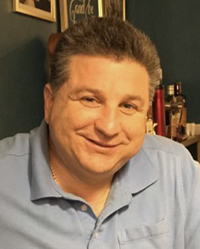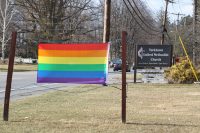Yorktown United Methodist Church Sends a Message Raising Rainbow Flag
By Michael Giuliano
On February 26, a Special Session of the United Methodist Church General Conference narrowly voted to maintain and strengthen its ban of the performance of same-sex marriage ceremonies and the ordination of ‘self-avowed practicing’ homosexuals within the church.
On February 27, the Yorktown United Methodist Church decided to raise a rainbow flag.
The vote by the General Conference has created great controversy since it occurred, and the church, led by Pastor Reverend Matthew Querns, wanted to make it plain for all to see that it would be a safe, welcoming space for all who wished to attend.
“We needed people to know that we were not to be feared,” Pastor Querns said in an interview. “It’s not just enough to be a welcoming church when people walk in the door. We wanted the people on the street, who won’t even get into our door, to know that they are welcome here.”
The vote occurred during a special emergency session of the United Methodist Church General Conference, which had last convened in 2016. Usually occurring every four years, the last meeting quickly became volatile for introducing what has been referred to as the “Traditional Plan,” which placed bans on same-sex marriage and openly-gay ministries within the church. This plan was brought up to replace the proposed “One Church Plan,” which would have allowed each individual church to decide whether or not to allow gay marriage and gay pastors. During the contentious 2016 conference, which saw many petitions trying to make the church more inclusive to LGBTQ (Lesbian, Gay, Bisexual, Transgender, and Queer) members, the council was on the verge of splintering. After bringing in the council of bishops to intervene, all matters were temporarily tabled until they could be rehashed at the then-upcoming special session of February 23-26, 2019.
“What must be known is that the Traditional Plan had been largely deemed unconstitutional to the United Methodist Constitution before it was even voted on,” Querns said. “So how can a body vote for something unconstitutional?”
Pastor Querns also stressed that the vote was only to bar same-sex marriages and the ordainment of openly-gay pastors within the church; this would in no way ban LGBTQ members from joining or becoming involved with the church, as they have been officially recognized and accepted as having sacred worth by church doctrine since the first post-merger General Conference meeting in 1972. Although the Traditional Plan has passed on the floor, it must still be reviewed by the judicial board in April, where Pastor Querns believes many aspects will be deemed unconstitutional and thrown away, although, if passed, certain elements will come into effect in 2020.
What makes the United Methodist Church different from other denominations, such as Presbyterians and Lutherans (which have nationally voted to become more LGBTQ-inclusive), is that its governing body is not just within the United States. The General Conference is a worldwide body divided into four regions: the United States, Europe, Africa, and the Philippines. Among voters in the United States, the vote was about 66% in favor of adopting the One-Church Plan. However, overwhelming numbers put up by the African constituency were enough to instead approve the Traditional Plan; the measure passed by just 27 votes in a body made up of over 800 delegates.
“They have a huge voting block, and they’re almost all solidly against it,” Pastor Querns said regarding the African continent’s stance on more LGBTQ inclusion. “We weren’t aware how committed some were to [being] un-inclusive.”
Still, Pastor Querns was clear that the results of the vote must be seen as an issue of contextualization; that having different cultures and traditions voting on one topic ignores the diversity of experiences within the cultures that make up the church, so no fault can be placed on any one region.
Brendan Fox, a Bethel, Connecticut native currently studying for a Masters in Divinity at Drew Theological School, was in attendance at the General Conference session as an observer, and witnessed the divisive atmosphere firsthand.
“There was a sense of apathy mixed with cynicism from some, while others expressed that this vote meant everything to them,” Fox said in an interview. “There was tension in the air throughout the duration of the conference. It felt as though every time the chance arose for the church to meet more in the middle, I was slapped in the face with just how divided the church really is.”
Still, Fox, like Pastor Querns, believes that there is hope to be found in the upcoming conference meetings, whether it be found in the actions of the judicial committee or in the voices and actions taken by fellow members of the United Methodist church.
“My hope is that enough individual hearts are changed and motivated to stand up for those whose voices continue to be silenced,” Fox said.
Fox is hardly alone in his wishes for the future of the church, and similar ones expressed by members of the Yorktown United Methodist Church led them to the decision to fly the rainbow flag in solidarity with the LGBTQ community. So far, Pastor Querns has said that the response to the flag has been overwhelmingly positive, garnering praise from not just members of his own flock, but from other churches and even general members of the Yorktown community.
“We were asking ourselves, ‘Who do we want the community to know us as?’” Pastor Querns said, referring to himself and the members of his church council. “We want to be known as the church of radical hospitality, inclusive love, and welcoming.” By 10:30 a.m. on February 27, less than 12 hours after the controversial General Conference vote took place, Querns and members of his Justice and Inclusion Ministry had unanimously voted to fly the rainbow flag.
In a letter addressed to his entire congregation, Pastor Querns reminded his parishioners that they were followers of Christ, who would hate none and love all, and that they would continue to preach a message of love and inclusivity for all who wished to join them.
“[The] Yorktown UMC will continue to be a beacon of light in this community, a place of welcome and of rest, of love and of support, of hope and of joy, of mission and of justice, and our doors will remain open to all who seek us out,” the letter read. “People in our community who read the newspapers and online reporting will know that we are not their enemy, we are their friends; we do not hate them, we love them; they do not need to hide from us, they are welcome with us. The flag is about letting those hiding and terrified know that they have a home with us and a God who is on their side.”
The Yorktown United Methodist Church is located at 2300 Crompond Road in Yorktown, across from the Yorktown Police Department. For more information, visit www.yorktownumcny.org, or call (914) 962-5749.

Rick has more than 40 years’ experience covering local news in Westchester and Putnam counties, running the gamut from politics and crime to sports and human interest. He has been an editor at Examiner Media since 2012. Read more from Rick’s editor-author bio here. Read Rick’s work here: https://www.theexaminernews.com/author/pezzullo_rick-writer/

